Choosing a career is no easy decision. After all, there are so many opportunities to pick from with no way to predict which one will be perfect for you. In high school and college, students learn about numerous careers but frequently end up surprised by the realities of a chosen occupation.
If you want to get a glimpse into the experiences of a professional in your dream field and ensure you’re making the right decision, try job shadowing. It’s like receiving a sneak peek into the profession without committing to a full-time job.
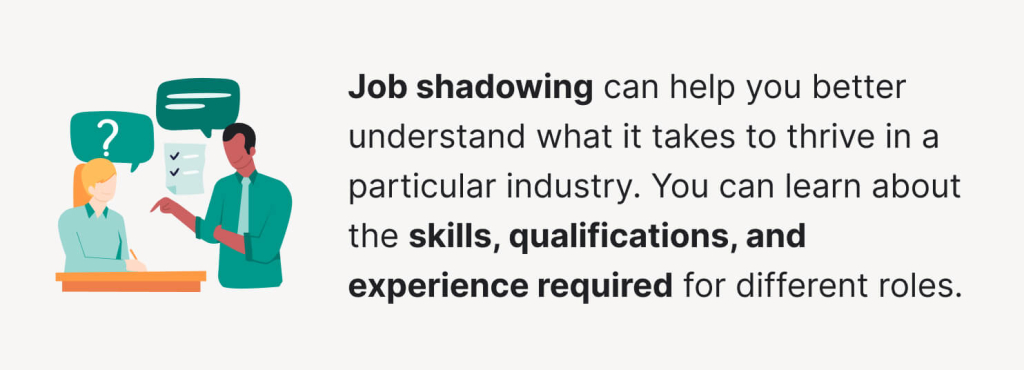
But what are the specific perks of job shadowing, and how can you use this option to the fullest? Find out in this article prepared by IvyPanda experts!
👤 What Is Job Shadowing?
Job shadowing is a career exploration event where a student follows and observes a specialist in their workplace for a certain period, ranging from a day to a week. Dongs so allows students to gain insight into the routine tasks, responsibilities, and competences involved in a specific job.
Virtual job shadowing is a perfect alternative for those who cannot be physically present at workplaces. Instead, they may do it through other means, including video conferences and VR. With virtual job shadowing, you can still discover the peculiarities of various careers without leaving home.
What Is the Purpose of Job Shadowing?
Job shadowing allows you to learn about the attributes of your chosen vocation by observing actual workplaces. Unlike simply reading or consuming media about the job, you see its reality. This helps you better understand the routine activities and difficulties involved in them. You also discover the prerequisites for success.
Through job shadowing, you will make grounded decisions regarding your career path and be better equipped for employment.
Why Is Job Shadowing Important?
Shadowing is a fantastic solution for students because it:
- Provides a firsthand look into the hottest careers.
- Allows students to ask questions and receive insights from professionals.
- Expands a student’s network with specialists from their preferred industry.
- Inspires them to pursue their career goals.
How Long Does Job Shadowing Last?
The duration of job shadowing can differ between industries, companies, and occupations. It can range from a few hours to several days or even weeks. Typically, this is enough for a student to:
- Explore the duties and responsibilities of a worker.
- Ask burning questions about the job.
- Participate in meetings or activities as appropriate.
- Learn about the company culture and labor conditions.
When to Do Job Shadowing?
Whether you’re a student exploring career opportunities or a professional seeking growth, job shadowing is great for you. You can actually do it at any stage in your life:
- While in high school. Teenagers may find shadowing opportunities through career centers, guidance counselors, or community organizations. This experience will be especially advantageous for those struggling to decide on their future career.
- While in college. College students can find suitable opportunities through their academic departments, career services, or alumni networks. Shadowing will allow them to explore their field of interest and network with professionals.
- When considering a career change. If you contemplate starting a new career, try shadowing beforehand. This way, you will get a practical understanding of the job and its features.
- When looking for professional growth. Even established specialists can benefit from shadowing experience. It allows them to observe relevant practices and learn from experts. It may also provide opportunities for mentorship and professional improvement.
What Happens after Job Shadowing?
Once a student is done shadowing, they’re usually encouraged to reflect on their experience and consider how it correlates with their aspirations. Students might get motivated to continue training, network with industry professionals, seek internships, or look for job opportunities. Those who were left unimpressed might try shadowing in another sphere.
Regardless of the outcome, it is essential to thank the employer for their time and insights. Try to maintain an amicable relationship with them for future opportunities. Some coordinators may also ask you to write a reflection journal or fill in an evaluation form.
🆚 Job Shadowing Vs. Internship
Job shadowing and internships are popular options for students seeking experience in a specific industry. While both options focus on learning opportunities, there are several fundamental differences between them.
- Duration. Job shadowing is brief, while internships can last up for several months.
- Role. In job shadowing, the student acts as an observer, while an intern is an active participant.
- Compensation. Job shadowing is always unpaid, while internships can sometimes be compensated.
- Purpose. Job shadowing is meant to show what a certain occupation is like, while an internship helps gain direct experience and develop skills.
- Responsibilities. Unlike interns, job shadowers have no designated tasks or obligations.
- Potential for future employment. Shadowing may lead to future job opportunities through networking and positive impressions. Internships frequently become a pathway to future employment with the same company.
🗂️ Types of Job Shadowing
Shadowing experiences differ among various professions and enterprises. The three most frequent types you might encounter are observation, hands-on shadowing, and regular briefings.
Observation
Observation is a method where students learn about an occupation by watching. Shadowing a professional in the relevant field gives them a real idea of what the job is like. A high school student interested in becoming a nurse may observe a registered nurse at a hospital to see what tasks they’ll have to perform if they choose this profession.
Hands-On
Hands-on job shadowing involves participation in relevant tasks. This activity is particularly beneficial for those who want to learn skills that require legitimate experience. For instance, a college student interested in event planning may shadow a specialist and assist with tasks such as setting up decorations or coordinating with vendors.
Regular Briefings
Regular briefings oblige you to attend conferences within the company. This approach is suitable for those who want to learn about the overall functioning of an enterprise. For example, an aspiring marketing professional may attend weekly strategy meetings to understand market trends and campaign planning.
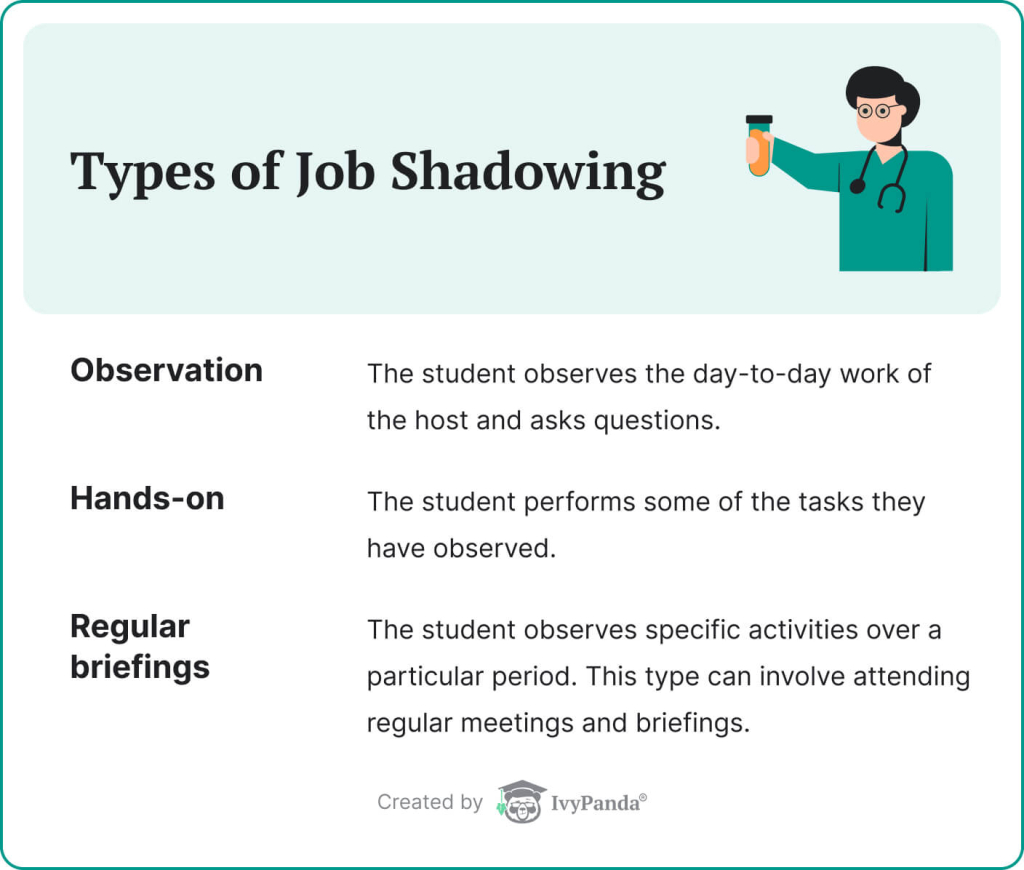
👨💻 Job Shadowing Examples: How It Works
So, what exactly happens during job shadowing? To help you get prepared, we’ll describe examples of shadowing in two popular professions: check them out below.
Nursing Job Shadowing
Nursing job shadowing will allow you to learn about registered nurses’ daily tasks. You may accompany the nurse on rounds and learn about various procedures. Most importantly, you can ask questions related to your observations. All this will help you decide whether medicine is the right career path for you to pursue.
If you decide to observe a nurse’s work, your job shadowing day might look like this:
- You will come early to the clinic on the set date.
- You will then meet your job shadow host and introduce yourself. You may also address some preliminary questions to them right away.
- As a nurse completes ward rounds, you’ll be able to accompany them during procedures and treatments. Although it will be forbidden for you to provide patient care, you may be asked to perform some simple supervised tasks, like fetching supplies.
- You might also get a chance to role-play for hands-on experience in nursing duties. For example, you may practice interviewing patients or responding to angry visitors.
- At the end of the day, you’ll discuss your observations and experiences with the host.
Interior Design Job Shadowing
Interior design is a fantastic career that’s unfortunately full of common misconceptions. For example, many believe that it is a simple occupation that only involves decorating spaces. However, spending one day with an interior designer will show that it’s a tricky and multifaceted job. Just like that, discovering the reality behind this activity will help you decide whether it’s right for you.
Your experience of shadowing an interior designer may look something like this:
- You’ll arrive at the designer’s place and get acquainted.
- Your shadowing host will take you to a meeting with a client. During this consultation, you will observe how they discuss crucial things like deadlines and budgets.
- After that, you and your host will proceed to create a concept board. You’ll learn how to make design plans and layouts. If you’re fortunate, you’ll even get the chance to operate the design software for creating models and presentations.
- Finally, you can go shopping for supplies with your host. You will see how to choose materials and furniture. Since interior designers commonly partner with suppliers and contractors, you will also learn how to coordinate with other specialists.
- At the end of your experience, which can last a few days, you’ll discuss your insights with your host and thank them for their lessons.
⭐ Benefits of Job Shadowing for Students
If you still wonder whether you should try job shadowing, consider the amazing perks you’ll get from it:
- Avoiding misconceptions about the job. Job shadowing allows you to gain a realistic and unbiased understanding of what professional work entails.
- Pinpointing your career interests. By observing employees in various companies, you can identify your passions and discover what is required for a stellar career. This can help you select your future vocation wisely.
- Learning to communicate. You will get an opportunity to practice professional communication skills, such as active listening and making slides.
- Improving your resume. Shadowing experiences can be included on your CV. This way, you will prove that you’re determined to get your desired job. Employers value applicants who have shown initiative and gained practical experience.
- Building a professional network. Meeting prominent specialists in your field of specialization is another benefit you should consider. Such connections can provide valuable mentorship, advice, and professional opportunities.
- Staying motivated in school. The excitement you get while shadowing will provide you with a tangible goal to work towards. It can also help you see the relevance of your curriculum for your future aspirations.
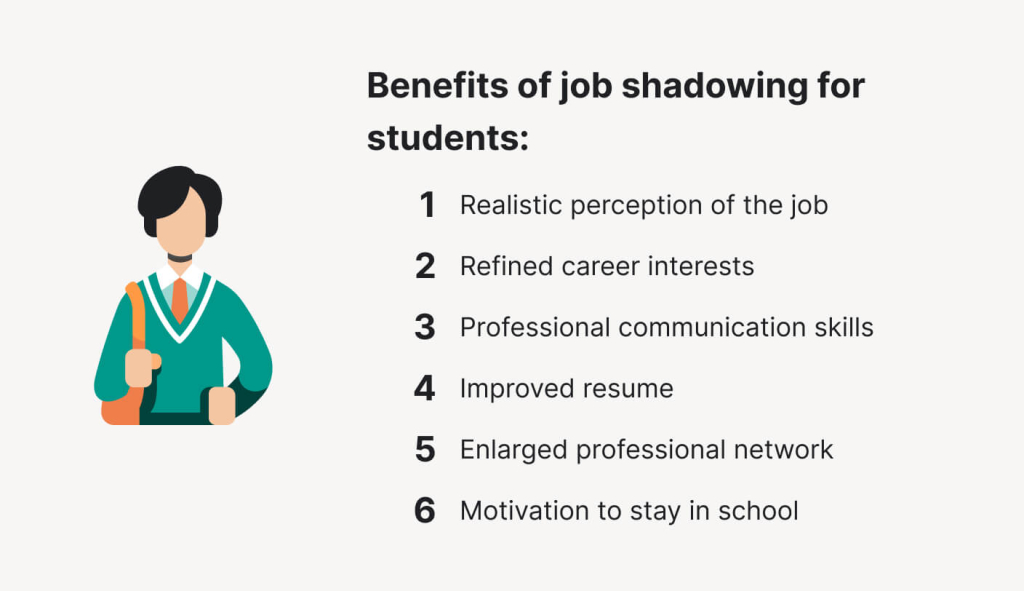
🔎 How to Find Job Shadowing Opportunities
Now, let’s explore actionable tips for locating the best shadowing opportunities.
- Start with your circle. Reach out to friends and associates who operate in the industry that fascinates you. Ask if they know of any shadowing opportunities or if they can introduce you to someone who can help.
- Contact your school’s career center. It might have means or connections to help you find exciting options. For example, the University of Chicago offers its students job shadowing in business, finance, arts, law, medicine, STEM, and more.
- Utilize online resources. Websites like LinkedIn, Glassdoor, and Indeed can be helpful sources of shadowing opportunities.
- Research companies. Identify businesses in your sphere of interest and reach out to them directly. Explain what you want and ask if they have any opportunities available. Even corporate giants like Amazon, CNN, and Google often accept students.
Remember to approach every person or company respectfully. Making a positive first impression will increase your chances of having a terrific job shadowing experience.
✔️ Best Job Shadowing Tips for Students
To help you ace your experience, we’ve collected the most beneficial tips from career experts and students who have successfully participated in job shadowing before.
Before Job Shadowing
- Research the company. Start by taking the time to learn about the organization or person you’ll be shadowing. This step will help you understand how they function and what to expect from them.
- Create a list of inquiries. Think about things to ask your host. Carefully prepared questions will show your interest in the job and help you gain more insight into the profession.
- Prepare to talk about yourself. Be ready to discuss your background, ambitions, and career goals. Self-disclosure will help you build a connection with the person you’re shadowing and potentially impress them.
- Confirm the day and time. It’s also crucial to remember the chosen location. Double-check any instructions or requirements provided by the company or person you shadow.
- Ask about the company dress code. It’s important to dress appropriately for your job shadowing experience. Ensure you wear suitable clothes to make a good first impression.
During Your Shadowing Experience
- Bring everything you might need. Remember to bring a notebook, writing utensils, and any other materials you might need to be prepared and organized. Moreover, don’t forget about refreshments so that you have enough energy for your workday.
- Arrive early. Plan to arrive at least 10-15 minutes early at the arranged location. Thus, you’ll show that you’re punctual and reliable, and you’ll have extra time in case of emergencies.
- Keep your cell phone muted. Prevent distractions by putting your smartphone on mute or vibrate mode. It’s paramount to pay maximum attention to the host.
- Prepare to sign an NDA. Many companies wish to safeguard their confidentiality and trade secrets. So, they may require you to sign a non-disclosure agreement before shadowing starts.
- Avoid interrupting your host’s work. Remember that they’re busy and have important duties. Don’t bother them unless it’s necessary.
- Take notes. Write down any key info to help you memorize specific insights. This habit will also show your engagement and curiosity.
- Be attentive. Ask questions and participate in discussions to prove your commitment to the vocation. Carefully observe everything your host does to learn as much as possible.
- Collect business cards. At the end of the experience, get business cards from the professionals you meet to remain in touch.
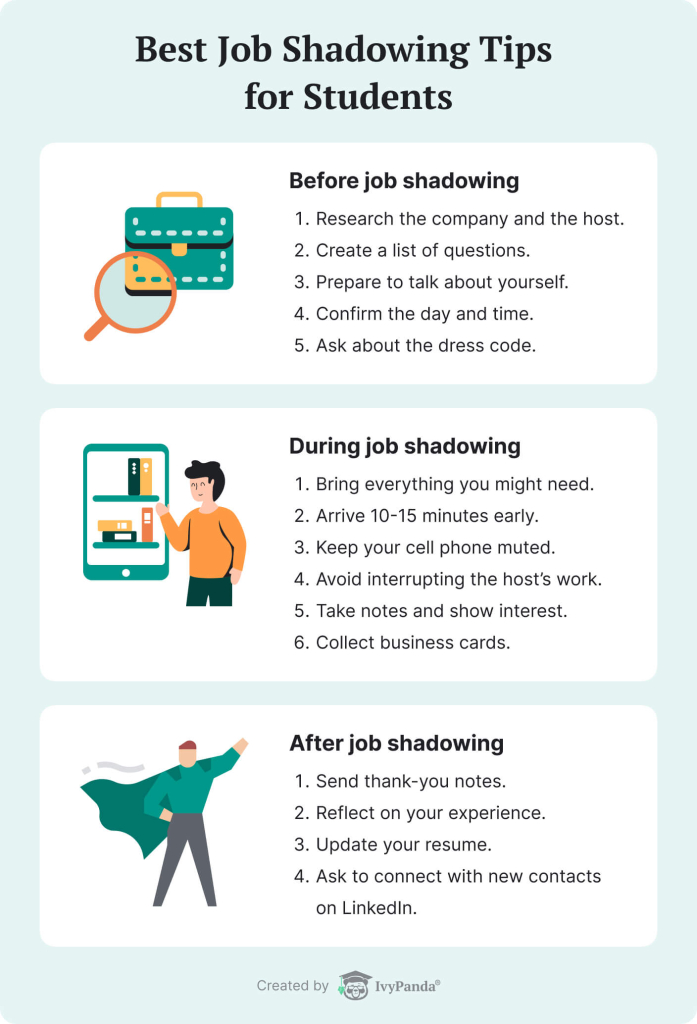
After Job Shadowing
- Send thank-you notes within 24 hours. Mailing thank-you notes to everyone who assisted you during your experience is a must. Your addressees should include the person you observed at work, any other employees you’ve met, and those who provided guidance or answered your queries. Be sure to express gratitude for their time and mention concrete things you appreciated.
- Reflect on your experiences. Thoroughly analyze everything you’ve discovered and see how it correlates with your aspirations. What challenges did you confront?
- Add it to your job portfolio. If shadowing is directly related to your vocational goals, consider adding it to your resume. Thus, you’ll prove your willingness to explore relevant opportunities. Note the company name, the person you shadowed, and a brief overview of the experience.
- Ask to connect with the community on LinkedIn. Networking is a fundamental component of a successful job hunt, and shadowing is a practical way to meet specialists in your preferred industry. It’s even better if you ask to connect with them on LinkedIn.
❓ Questions to Ask When Job Shadowing
Asking thoughtful questions in addition to observing can help you get a next-level experience. Below, you’ll find essential aspects to ask your host about. You can use them to gain as much practical knowledge as possible at each stage. To make it more handy, we’ve grouped the queries into different categories.
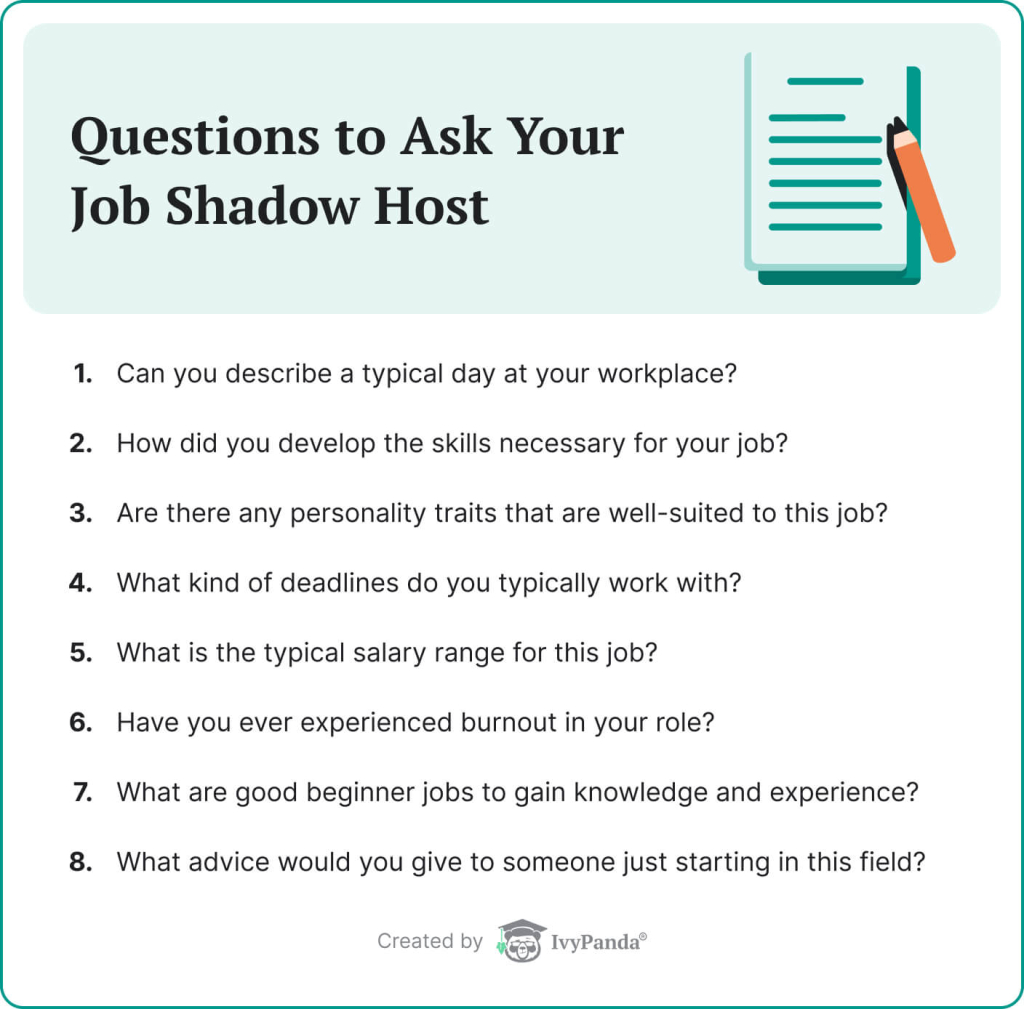
Introductory Questions
These preliminary questions will help you connect with your host and receive some initial insights into the job:
- What inspired you to pick this vocation as your calling?
- What was your experience getting started in this industry?
- Can you tell me more about your routine tasks?
- What facets of your work are the toughest to cope with?
- What abilities do I need to excel in this role?
- Could you disprove some misconceptions about your profession?
- What recommendations would you give to a novice interested in this industry?
Qualifications
You will also want to learn about the skills and expertise required for the job. Ask these questions to figure that out:
- What sort of training do I need to deal with this job successfully?
- What certificates or licenses does it require?
- What helped you cultivate the skills necessary for your profession?
- Are there any helpful courses you would suggest to someone who dreams of this career?
- How important is continuing education in this industry?
- What kind of experience or background do employers typically expect from applicants?
- Are there any specific personality traits that are well-suited to this vocation?
- What advancement opportunities can I expect within this field?
Job Responsibilities
The below questions will help you determine what you’ll be regularly doing if you follow the same career path as your host:
- Can you detail your typical project to me?
- How do you prioritize multiple tasks and duties?
- What deadlines do you mostly operate within?
- How much collaboration is involved in your job?
- Which specific software programs or tools do you use routinely in your work?
- What helps you stay industrious and manage your workload?
- Do you receive helpful feedback concerning your performance?
Salary and Benefits
Many students have unrealistic expectations about their prospective earnings. To avoid an unwelcome surprise, you can learn about compensation and benefits in your chosen job right away from the host. Just ask the following questions:
- What’s the normal compensation range for the work you do?
- Is it possible to negotiate a raise or promotion?
- Are there any bonuses or incentives offered at this company?
- What about vacations or paid time off within your organization?
- Do the employers provide any retirement or savings plans?
Personal Job Satisfaction
Research suggests that an average person spends about 90,000 hours at work over their life. It’s over ten years! That’s why it’s paramount to find a job that will be gratifying and pleasant. Ask your host the questions below to learn about the rewarding sides of your dream career.
- What do you consider most fun about your job?
- Have you ever experienced burnout? If so, how did you overcome it?
- What helps you strike a balance between work and leisure?
- What prominent challenges did you face in everyday life because of your job?
- How do you stay inspired and committed to your vocation?
- Are there any outstanding career accomplishments that you are particularly proud of?
- How would you characterize your work’s impact on your personal success?
Additional Questions
Here are some more questions that will provide valuable insights about your selected job.
- What tips would you offer a candidate who wants to ace a job interview?
- How do you predict this field will transform in the next 5-10 years?
- What advice would you give to someone curious about this field of work?
- What soft and hard skills would you recommend mastering to thrive in this role?
- How do gadgets aid you in professional activities?
- What beginner jobs can help me acquire knowledge and experience?
- Are there any organizations or associations that are important for professionals in this industry to be involved with?
Ultimately, job shadowing can be a life-altering experience that might help you find your vocation. It’s your chance to learn exciting insights and connect with professionals who share your interests. So, take the first step and start exploring your dream career today!
We hope this article has inspired you to take action and try job shadowing for yourself. If you liked it, share this page with your friends and leave a comment below!
🔗 References
- Job Shadowing Guidelines: University of Bristol
- Types of Job Shadowing: University of Cambridge
- Job Shadow Guide: Center for Science Education
- How To Job Shadow (With Tips for a Positive Experience): Indeed
- Complete Guide: Job Shadowing for High School Students: PrepScholar
- Job Shadowing: Wellesley College
- Job Shadowing for High School Students (And Why It’s Important): Indeed
- Job Shadowing: Idaho State University
- Job Shadowing Program, J-Term Opportunity: The University of Rhode Island
- Shadowing & Professional Observation: Drake University
- Job Shadowing Etiquette: Brigham Young University
- Helpful Job Shadowing Questions: College of Agriculture and Life Sciences
- Examples of Questions to Ask During a Job Shadow: Nebraska Department of Education
- 40 Job Shadowing Questions (With Sample Answers): Indeed
- Typical Job Shadow Activities and Sample Questions: Loyola University Chicago
- Job Shadows: Oklahoma CareerTech
- Job Shadowing: Florida State University, the Career Center
- Job Shadowing: Wisconsin Department of Public Instruction
- What Is Job Shadowing?: The Balance
- How to Start Job Shadowing: ACT

![How to Write a CV: 11 Useful Tips [Infographic]](https://ivypanda.com/blog/wp-content/uploads/2020/11/company-human-resource-hr-is-holding-resume-application-tablet-hand-309x208.jpg)

